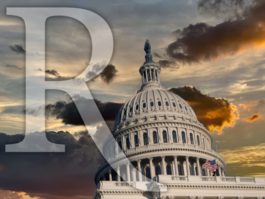Voters Still Put Lower Costs Over Health Insurance Mandate
As Congress begins debating ways to change the failing Obamacare system, voters feel more strongly than ever that reducing health care costs is more important than mandating health insurance coverage for everyone.
The latest Rasmussen Reports national telephone and online survey finds that in terms of reforming health care, 62% of Likely U.S. Voters feel it is more important to reduce the cost of care. That’s up from a previous high of 59% in January of last year. Thirty-four percent (34%) still place more importance on making sure that everyone has health insurance, but that’s a new low. (To see survey question wording, click here.)
Thirty-six percent (36%) continue to believe, however, that the government should require every American to buy or obtain health insurance. Fifty percent (50%) oppose Obamacare’s health insurance mandate, while 14% are undecided.
Support for the individual mandate in regular surveys over the last several years has run from a high of 44% in November 2014 to a low of 32% in October of the following year.
As there have been for years on nearly all questions related to the national health care law, however, there are wide partisan differences of opinion.
(Want a free daily e-mail update? If it's in the news, it's in our polls). Rasmussen Reports updates are also available on Twitter or Facebook.
The survey of 1,000 Likely U.S. Voters was conducted on March 8-9, 2017 by Rasmussen Reports. The margin of sampling error is +/- 3 percentage points with a 95% level of confidence. Field work for all Rasmussen Reports surveys is conducted by Pulse Opinion Research, LLC. See methodology.
Only 12% of voters want to leave Obamacare alone, but 88% say it’s important for Congress and the president to have some sort of replacement program in place if they repeal it.
Eighty-two percent (82%) of Republicans and 64% of voters not affiliated with either major political party think it is more important to reduce the cost of health care. Just 42% of Democrats agree. Most Democrats (54%) say making sure that everyone has health insurance is more important.
But then Democrats by a 49% to 36% margin believe the government should require every American to buy or obtain health insurance. Only 25% of Republicans and 32% of unaffiliated voters share that view.
Those under 40 are stronger supporters of the individual mandate than their elders are, but younger voters also feel most strongly that reducing health care costs is more important.
Blacks support the insurance mandate more than whites and other minority voters do. While most whites and other minorities rate cost reduction as more important than the mandate, blacks are almost evenly divided on the question.
Even among voters who believe the government should require every American to buy health insurance, 41% believe reducing health care costs is more important. That compares, however, to 79% of those who oppose the insurance mandate.
While most Americans say their personal health hasn’t changed much over the past five years, most are paying more for health care now.
Many Americans continue to feel the pinch of high health care costs. Thirty-six percent (36%) say they have postponed medical checkups or procedures to save money in the last six months, while 21% have not filled a recent prescription because the cost was too high.
Most voters have long said Obamacare is more likely to raise health care costs than to reduce them.
Citing financial losses, several major health insurers have pulled out of the state exchanges set up under the health care law, leaving many Americans with fewer insurance options and higher rates. But voters don’t think taxpayers should help offset any jump in rates they may experience because of the exit of these companies.
Additional information from this survey and a full demographic breakdown are available to Platinum Members only.
Please sign up for the Rasmussen Reports daily e-mail update (it's free) or follow us on Twitter or Facebook. Let us keep you up to date with the latest public opinion news.
The survey of 1,000 Likely U.S. Voters was conducted on March 8-9, 2017 by Rasmussen Reports. The margin of sampling error is +/- 3 percentage points with a 95% level of confidence. Field work for all Rasmussen Reports surveys is conducted by Pulse Opinion Research, LLC. See methodology.
Rasmussen Reports is a media company specializing in the collection, publication and distribution of public opinion information.
We conduct public opinion polls on a variety of topics to inform our audience on events in the news and other topics of interest. To ensure editorial control and independence, we pay for the polls ourselves and generate revenue through the sale of subscriptions, sponsorships, and advertising. Nightly polling on politics, business and lifestyle topics provides the content to update the Rasmussen Reports web site many times each day. If it's in the news, it's in our polls. Additionally, the data drives a daily update newsletter and various media outlets across the country.
Some information, including the Rasmussen Reports daily Presidential Tracking Poll and commentaries are available for free to the general public. Subscriptions are available for $4.95 a month or 34.95 a year that provide subscribers with exclusive access to more than 20 stories per week on upcoming elections, consumer confidence, and issues that affect us all. For those who are really into the numbers, Platinum Members can review demographic crosstabs and a full history of our data.
To learn more about our methodology, click here.




